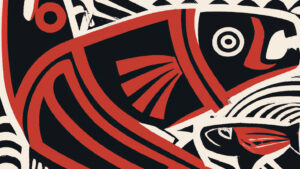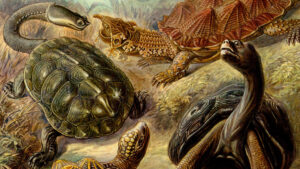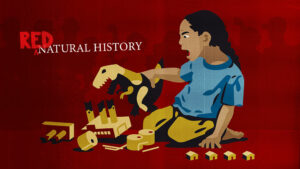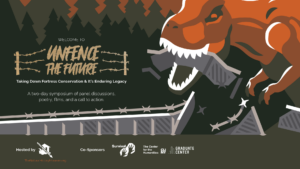In a time when critical and creative inquiry are under attack, The Natural History Museum is inviting applications for the 2026-2028 Red Natural History Fellowship, a two-year program dedicated to co-creating a “natural history for a world in crisis”—one that confronts the systems that reproduce colonial and ecological harm, supports communities leading struggles for justice, and honors life in all its forms.
With support from our research, curation, and production staff—as well as the growing network of Red Natural History Alumni—Fellows have opportunities to connect, amplify, and develop their work. The program brings together researchers, practitioners, and campaigners advancing Indigenous knowledge, public history, geography, cultural and ecological stewardship, water protection, land defense, and other liberatory forms of inquiry and practice.
Through quarterly cohort calls, cross-pollination and skill-sharing sessions, and NHM-produced virtual events and media spotlights, Fellows build community with one another and gain visibility for their work among wide public audiences.
Each Fellow receives a $2000 stipend, production and communications support, and entry into a growing community of practice for insurgent scholar-activists working to make change in their fields, institutions, and the world we share in common.
Five Fellows will be selected for the 2026-2028 cohort.
Learn more and apply by December 12, 2025.
Background
As environmental emergencies intensify, scholars and scientists are working directly with communities to expose the impacts of industrial pollution on public health, protect sacred items or ancestral remains threatened by pipelines, and sound the alarm about the systemic causes of climate change—leveraging their expertise and institutional resources in the shared struggle for a world beyond extraction.
The Red Natural History Fellowship supports this growing movement by connecting and catalyzing collaborations among emerging and established scholars, writers, organizers and practitioners advancing a non-capitalist and anti-colonial practice of natural history—one grounded in protecting the world we share in common for the generations to come.
Created to incubate and amplify public scholarship and field-building (or field-pushing) initiatives, the program aims to accelerate change, redress colonial and environmental harms, and advance—in both theory and practice—a vision of natural history that honors the past and charts a just future for all life on Earth.
Through public events, media projects, and other collaborations, the program supports efforts to transform disciplines linked to natural history—from conservation to archaeology and environmental science—building a community of practice rooted in non-colonial and non-capitalist ways of knowing and relating to the land and each other.
The Red Natural History Fellowship program aims to:
- Enable researchers and educators to grow their professional connections, community, and audiences across generations and disciplines;
- Support Fellows to navigate and thrive in professional conditions when the very premises of their careers and institutions may be under threat;
- Provide grounding and support for people producing justice-oriented work in a reactionary political context;
- Highlight applied scholarship and action research by emerging and established leaders in academic and public service roles;
- Equip educators, land use and environmental management practitioners, and community organizers with ideas that strengthen non-extractive approaches to their work;
- Generate written and recorded content that helps educators, scholars, and practitioners confront and transcend the colonial logics embedded in institutions of preservation, science education, and conservation;
- Foster informed, timely dialog about science-informed futures grounded in anti-imperialist analysis.
Fellowship Details
Each Fellow is supported by NHM staff to advance their own goals and vision during the fellowship period. Over the two-year cycle, Fellows take part in:
- Quarterly cohort calls for connection, cross-pollination, and skill-sharing.
- A video interview about their work and interests.
- The development of two public virtual events within NHM’s Natural History for a World in Crisis series, each produced in collaboration with our research, design, and communications team, with full production and promotion support.
- Quarterly updates highlighting ongoing work for inclusion in NHM newsletters.
NHM supports Fellows by:
- Providing research, design, communications, and production support for events, interviews, and other collaborative projects.
- Amplifying Fellows’ work on NHM’s website and through our 100,000+ subscriber network.
- Facilitating connections with professional networks and alumni Fellows.
- Offering optional workshops and skill-sharing opportunities tailored to Fellows’ interests.
Each Fellow receives a $2,000 stipend in recognition of their participation.
Timing
Applications are due by December 12, 2025.
Notifications expected by January 5, 2026.
Program kick-off in late January, 2026.
To Apply
Apply here: https://bit.ly/rnh-fellows-2026-2028
You will be asked to submit:
- Your name and contact information;
- CV/Resume, LinkedIn profile, or other work experience list;
- Responses two interview questions (1-2 pages)
- 1-2 work samples (e.g. links to writing, videos of public talks, organizing/advocacy work, or creative projects).
Resources
READ: What is “Red Natural History”?
- Red Natural History, Social Text essay series with the first cohort of Fellows
- Coming Out the Other Side: Notes on an Eight-Year Expedition into Natural History, NHM essay in Society & Space
- Towards a Theory of Red Natural History, NHM essay in Society & Space
WATCH: Members of the 2023-2025 Fellowship Cohort
- Collectivist Ecologies: Red Natural History, Public lecture by geographer Andrew Curley (Diné) and NHM Research Director Steve Lyons
- Red is a Sacred Color, Interview with environmental historian Rosalyn LaPier (Blackfeet/Métis)
- The Divide in Natural History, Interview with geographer Kai Bosworth
- From Competitive Individualism to Mutual Aid, Interview with environmental humanities scholar Ash Dawson
- Indigenizing Environmental Justice, Interview with writer and educator Dina Gilio-Whitaker (Colville Confederated Tribes)
- Rethinking the Water Paradigm, Interview with geographer Andrew Curley (Diné)
Contact: fellows@thenaturalhistorymuseum.org





